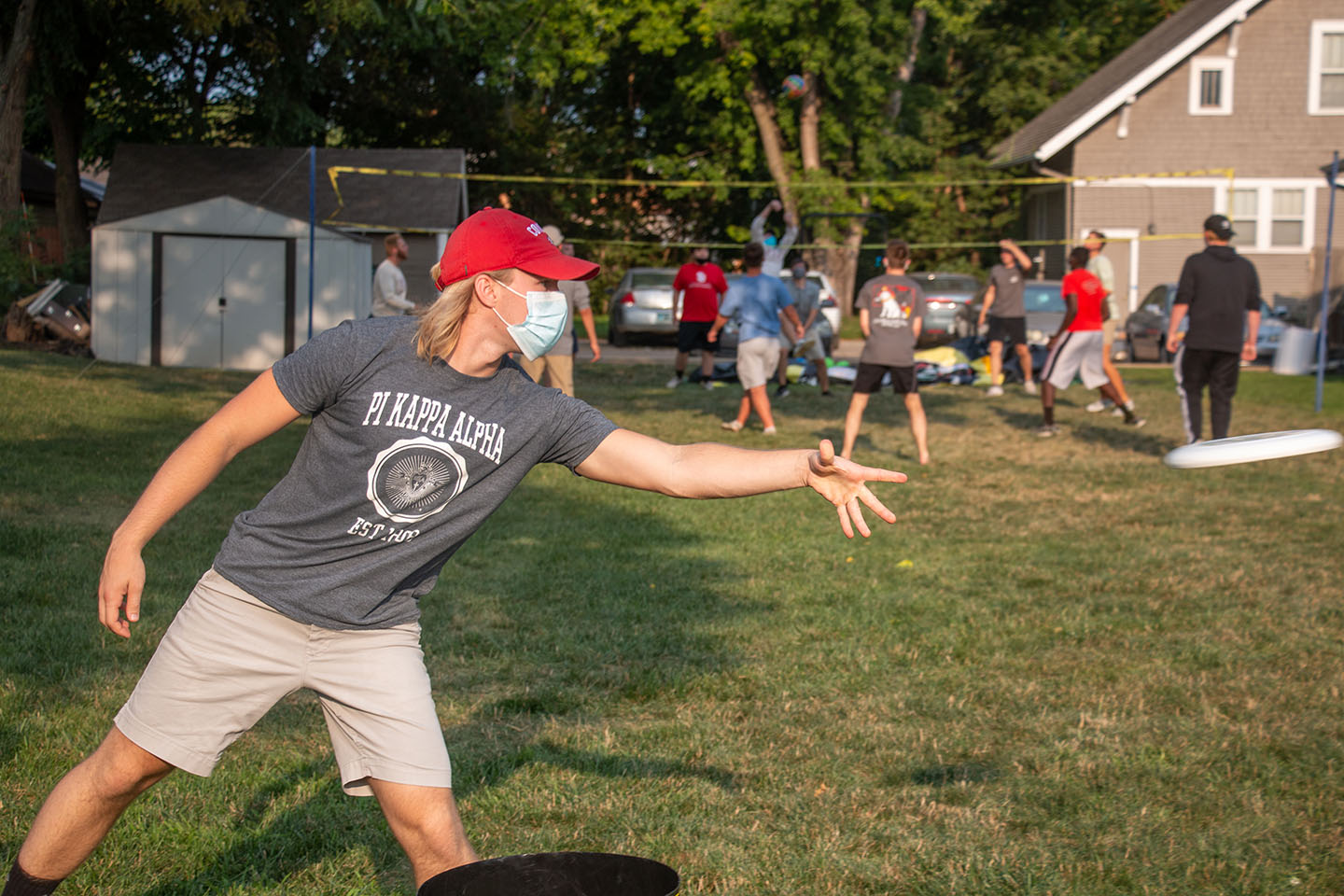
Greek Life adjusts to COVID-19
From chapter houses to recruitment, Greek Life at USD is undergoing some major changes to protect its members in the time of COVID-19.
Because fraternities and sororities have different guidelines than other student organizations, each has a different approach to prevent the spread of the virus.
COVID-19 Policies
Laura Anderton, Director of Sorority and Fraternity life, said there are no overarching safety guidelines for Greek Life because the chapters are privately owned. Over the summer, each chapter developed safety policies specific to its members, which Anderton and Dean of Students Kim Grieve reviewed.
“They were given a lot of guidance from our office, and that guidance came from the CDC, from their national organizations, from our national umbrella organization, so there was a lot of resources for them as they were creating those plans,” Anderton said. “They are as solid of plans as I think we could put together.”
While each chapter’s “COVID plan” is unique, they all include sections on the chapter’s response in the event one of its members gets sick. Anderton said in general, the chapters plan to either send the sick member home or quarantine the member in a chapter facility.
“If they either couldn’t identify that space or they have overflow in that space, then we’ve worked with one of the hotels in town to be able to have that as an auxiliary quarantine space,” Anderton said.
If USD’s campus closes, all Greek Life activities are expected to be held remotely. Students living in chapter houses will be allowed to stay at the discretion of their chapter.
Andrew Tiede, president of Pi Kappa Alpha (PIKE), said in addition to requiring masks in PIKE’s house, members must sign in whenever they enter the house so the chapter can contact-trace in the event a member gets sick.
PIKE’s quarantine space is the president’s bedroom because it has its own bathroom and shower. Two chapter members can isolate in the room. If more members get sick, they will be isolated in their personal rooms and the chapter will schedule times in which they can use bathrooms and showers.
Tiede said there are about 20 members living in the PIKE house. A maximum of six residents could get sick before the house would have to be quarantined.
“We could probably manage it where we can take care of four to five people. If it gets to six, everyone’s in crisis mode. No one can leave the house for 14 days, and we’ll have people deliver food in and out,” Tiede said.
Recruitment
Fraternities are still finding ways to engage with prospective members despite the pandemic.
PIKE is hosting house tours for small groups of students, but otherwise, all other recruitment activities have moved outdoors.
“All our events are yard games, like cornhole and soccer darts for distance. We’re trying to think of innovative solutions to keep people away from each other and a little more sanitary,” Tiede said. “It hasn’t changed in the sense that it’s an opportunity to meet people and make new friends.”
Quentin Judas, president of Phi Kappa Theta (Phi Kap), said his chapter had initially planned lawn games and catering but cancelled all in-person events out of safety concerns.
“We thought it would be better for us to go ahead and cancel as much of our in-person stuff that we could to protect the people that we would be meeting and initiating,” Judas said. “You’re here for school, you really don’t want to start off the school year getting sick.”
Judas said Phi Kap plans to host a movie on Zoom, and may also hold internet gaming events. Phi Kap also plans to hold study sessions to get its members and hopefuls alike into the habit of studying.
Future Events
To insure student organizations and Greek Life chapters uphold social distancing guidelines at their events, the university has added an additional question to the USD Involved website. When organizations register an event, they will now have to explain how they plan to mitigate the spread of the virus.
“If the chapter can answer that question really well and has really good plans in place, then we don’t see a reason why they can’t necessarily have those events,” Anderton said. “If, however, they can’t answer those questions…they really have to go back to the drawing board and rethink some of those events.”
Anderton said she has been working with chapters to figure out how to safely host events like formals and mixers, though generally the chapters have decided against hosting such events.
Judas said Phi Kap has not made definitive plans for big events, though he wants the chapter to remain in the public eye.
“Right now we are keeping everything pretty fluid. We want to make sure that we are able to move around, keep stuff open, because we don’t want to make too many plans that have to be cancelled,” Judas said.
Phi Kap intends to continue its philanthropy, Judas said, even if campus closes and it must be done remotely.
“There are guidelines that we have to follow, and we want to try and make sure we follow them as close as we can,” Judas said. “If we can keep people even more safe by taking a step back from (events), we’re going to try and do that too.”


